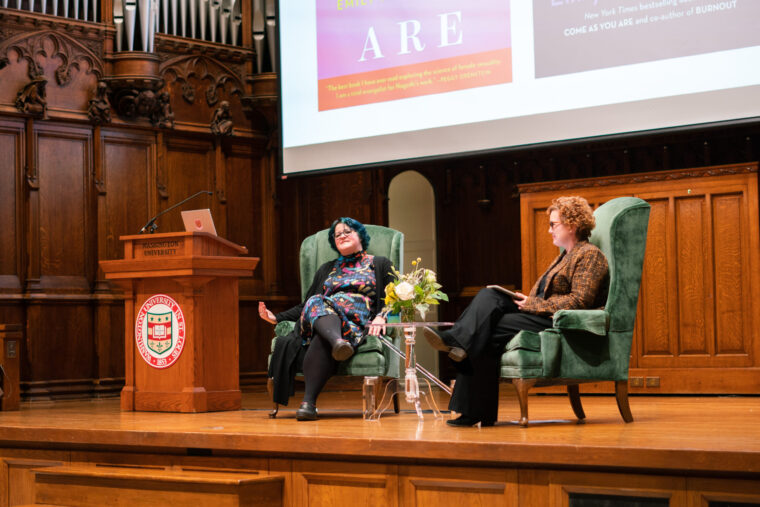News
Author Emily Nagoski reveals the secrets to extraordinary sex

Alan Zhou | Student Life
Dr. Emily Nagoski, a New York Times bestseller and long-time sex educator and researcher, gave a talk titled “The Science of Sex in Long-Term Relationships” in a packed Graham Chapel on Nov. 16.
Nagoski spoke to an audience of students, alumni, faculty, and adults from St. Louis and beyond about the state of mind required to enjoy “extraordinary” sex, and rebuked many common misconceptions about sex and sexual well-being.
The talk was a Masters and Johnson Lecture sponsored by Washington University’s Provost Office; The Brown School; MSQ Sexuality Specialization; and The Sexuality, Health, and Gender Center. This annual lecture honors Washington University sex researchers William Masters and Virginia Johnson.
In her talk, Nagoski said that “keeping the spark alive” is perpetuated in many articles and conversations about sex — an idea that she said is unfounded.
“The research doesn’t have anything to say about ‘spark,’” Nagoski said. “When the researchers talk to people who have sustained strong sexual connections over the long term, they don’t talk about ‘spark.’”
According to Nagoski, people who self-identify as having extraordinary sex typically have their first experience of extraordinary sex at 55 years old.
Nagoski also said that a commonality amongst long-term couples with healthy sex lives is an emphasis on pleasure instead of frequency.
“You know what [long-term couples who have extraordinary sex] talk about? Authenticity, vulnerability, and pleasure,” she said.
Nagoski also said that communication is very important when it comes to pleasure and sex.
“The people who have the best sex life talk about it all the time,” Nagoski said. “Not because they’re trying to solve a problem, but because that’s how you stay connected to what’s happening with your partner and what’s happening with your own body.”
Kristi Gunther, Assistant Director of Special Events, said that it is important to have events that discuss sexual well-being, especially on college campuses, when interviewed after the talk.
“I think [the talk] brings everybody together into this open space to talk about something that’s not common to talk about,” Gunther said. “There are so many people that want to talk about [sexual health and enjoyment] that don’t have an outlet — here it is. [The talk] makes it less taboo.”
When introducing Nagoski, Provost Beverly Wendland said that she was proud that the University focuses on topics such as sexual health and education.
“I never tire of boasting, just a little, that WashU has the only specialization of this kind within the Masters of Social Work program,” Wendland said. “Its popularity symbolizes the value it brings to the education of our students.”
Finally, Nagoski presented the audience with several questions to keep in mind when thinking about their sexual health and enjoyment.
“What is it you want when you want sex?” Nagoski said. “What is it that you don’t want when you don’t want sex? What kind of sex is worth having, and what would you be willing to do to create that in your life?”
When interviewed after the event, therapist intern Rita Elisa Vega noted the prevalence of issues about a healthy sex life, citing the questions Nagoski posed as a useful tool for thinking about one’s sex life.
“I really liked the questions that she had at the end; they’re something I definitely plan on asking my clients specifically,” Vega said. “They’re so simple, and yet, something that nobody has really ever asked or thought about, really.”
Nagoski has published several books on sexual enjoyment and education, such as “Burnout,” “Come as You Are,” and “Come Together.” In her talk, Nagoski provided a roadmap for reading them.
“So if you’re like, ‘I’m not in a place where I can even begin to think about my sexual well-being’: Burnout,” Nagoski said. “If you’re in a place where you can think about your personal sexual well-being: Come as You Are. If you are ready to think about your sexuality as it exists in relation to somebody else, Come Together is the book for you.”
Ultimately, Nagoski urges the audience to relax and lower the stakes behind sex in their lives.
“We have been raised to believe that our whole identity and our worth as human beings can be measured by our success at sex,” Nagoski said. “The reality is, in a healthy relationship, there’s nothing at stake. There is no right or wrong answer — because it’s a game that you’re playing together. You are having fun.”
